In this spotlight, Lizeth Olaya Zambrano, Pure Earth’s new Country Director for Colombia, shares an update on the work of our team in Colombia. Their recent accomplishments include winning one of the top prizes in a global competition to conserve the Amazon rainforest.
Stay up to date on our work in Colombia: Visit our Pure Earth Colombia page; subscribe to Pure Earth Colombia’s Spanish language monthly newsletter or follow Pure Earth Colombia on Facebook, Instagram and Twitter.
At Pure Earth Colombia, we work in the present thinking about the future we want to see.
To achieve this, we will continue to strengthen our relationship with partners in the public and private sectors, academia, and civil society, in order to establish synergies and enhance global collaboration at a technical and strategic level. For this reason, we work every day to be an organization that knows the country and its regional realities.

The progress that we have achieved to date is largely due to the dedication and commitment of a technical team whose expertise has made Pure Earth Colombia’s work recognized regionally as a benchmark of knowledge and innovation.
The development and consolidation of the office in Colombia was pioneered by Alfonso Rodriguez, Pure Earth’s current Global Technical Manager and the coordinator of Pure Earth’s global mercury strategy. Since 2016, Alfonso has worked to assemble a team of researchers with whom important advances have been achieved in the sustainable approach to the causes of lead and mercury contamination affecting Colombian communities.
The team includes Angie Tatiana Ortega, a chemical and petroleum engineer and project management specialist with a Masters in Environmental Management and a Ph.D. in Sustainability; Diego Marín, a researcher with a degree in chemical engineering who is a specialist in environmental management; Andrea Vera, a chemical engineer; Daniela Alonso Molano, a health physician with expertise in in human rights and gender issues; and myself, Lizeth Olaya Zambrano, the country director. (Scroll below to learn more about the Pure Earth Colombia team.)
Guided by our commitment to being part of the solution, the Pure Earth Colombia team is moving forward together, with the support of our strategic allies, with two main focuses: the investigation of lead and mercury-contaminated sites in the country, and the implementation of solutions that allow us to live in a healthier world, free from exposure to contamination, especially those caused by these toxic heavy metals.
Here are some of the projects we are working on.
PROJECT HIGHLIGHTS
Identifying Toxic Sites
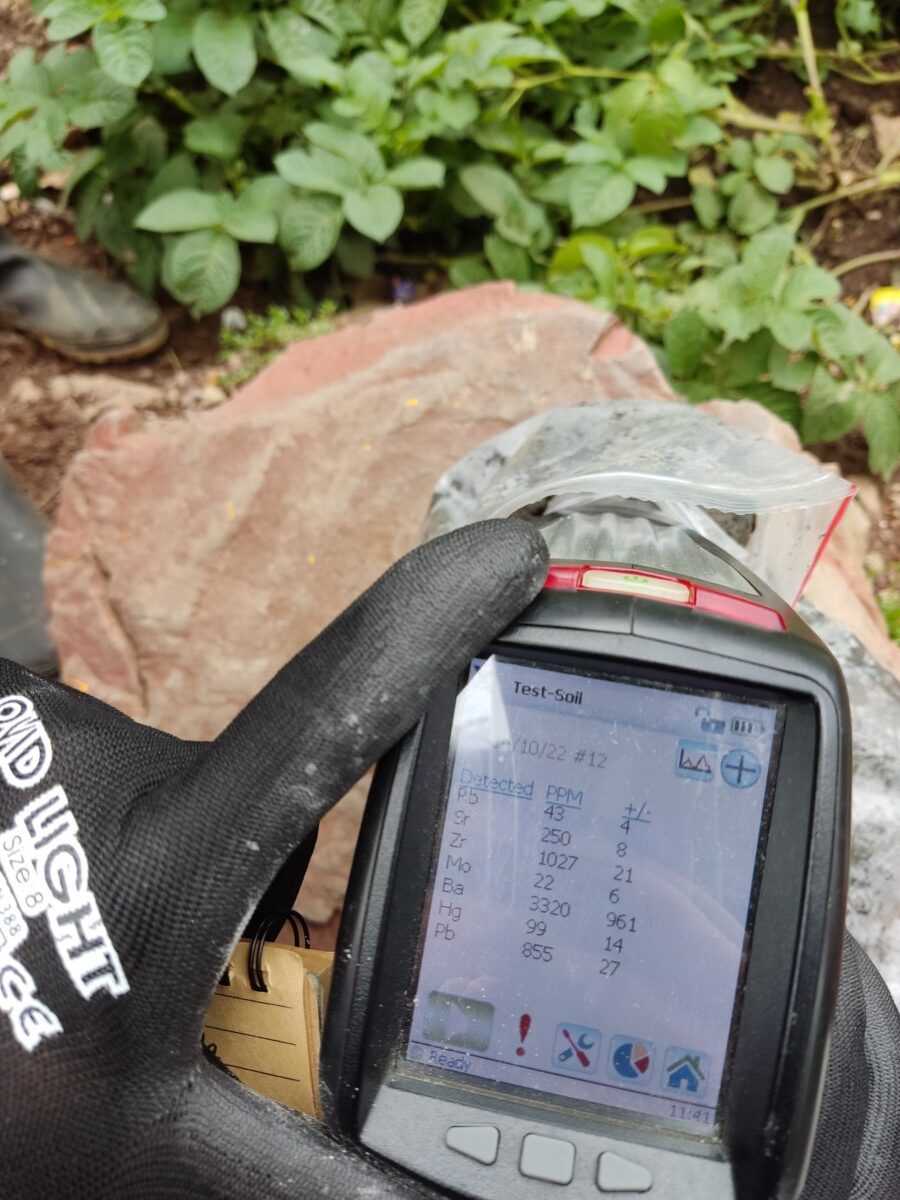
During the last year, Pure Earth Colombia surveyed 43% of the national territory as part of the Toxic Sites Identification Program (TSIP). 57% of the sites were found to be contaminated with mercury caused by small-scale artisanal gold mining activities, while 22% were contaminated with lead due to smelting activities from the recycling of used lead-acid (car) batteries.
TSIP started in Colombia in October 2016. Since the beginning of its implementation until December 2022, the program has had various funders that supported its maintenance and the collection of information, including the UNDP (United Nations Development Program), which supported the investigation of 35 sites with potential mercury contamination.
Similarly, the Ministry of Environment and Sustainable Development, the Ministry of Health, the National Health Institute and the Government of Cundinamarca supported site assessments in different areas of the country, where lead, pesticides and other toxins such as arsenic were initially considered as key contaminants.
The participation of regional environmental and health authorities has been fundamental for the development of site investigations in Colombia.
MERCURY PROJECTS
Promoting the recovery and responsible management of mercury from contaminated artisanal gold mining tailings

In collaboration with stakeholders from government, civil society, the private sector and affected communities, this U.S. State Department-funded project supports national efforts to reduce the amount of mercury used in artisanal and small-scale gold mining (ASGM), as well as in the development of models that most effectively address mercury use and disposal.
In particular, the project identifies responsible mercury recovery techniques from contaminated artisanal gold mining tailings and increases understanding of its use in the Colombian ASGM context. To this end, we developed a model for the responsible and cost-effective recovery of mercury and gold from tailings, along with technical protocols for safely handling and storing mercury, and eliminating it from ASGM activities.
Fundamental to this project was the participation and involvement of government entities such as the Ministry of Environment and Sustainable Development, Ministry of Mines and Energy, Ministry of Health and Social Protection, Ministry of Labor, Colombian Geological Service, National Mining Agency and the Mining-Energy Planning Unit, with whom we worked on:
- Mercury precipitation, adsorption and bioadsorption tests with 5 agents, of which only Sodium Sulfate presented expected yields.
- Joint work with Duke University for the development of specialized workshops.
- Training to 227 miners on the management of contaminated tailings using copper plates, together with the Ministry of Mines and the Mining Learning Center.
- Support to the Ministry of Mines in the identification of new sites potentially contaminated with mercury.
- Legal and regulatory analysis for the temporary storage of mercury, and allocation of ownership and responsibility for mine tailings.
Testing and building an economic model for mercury recovery
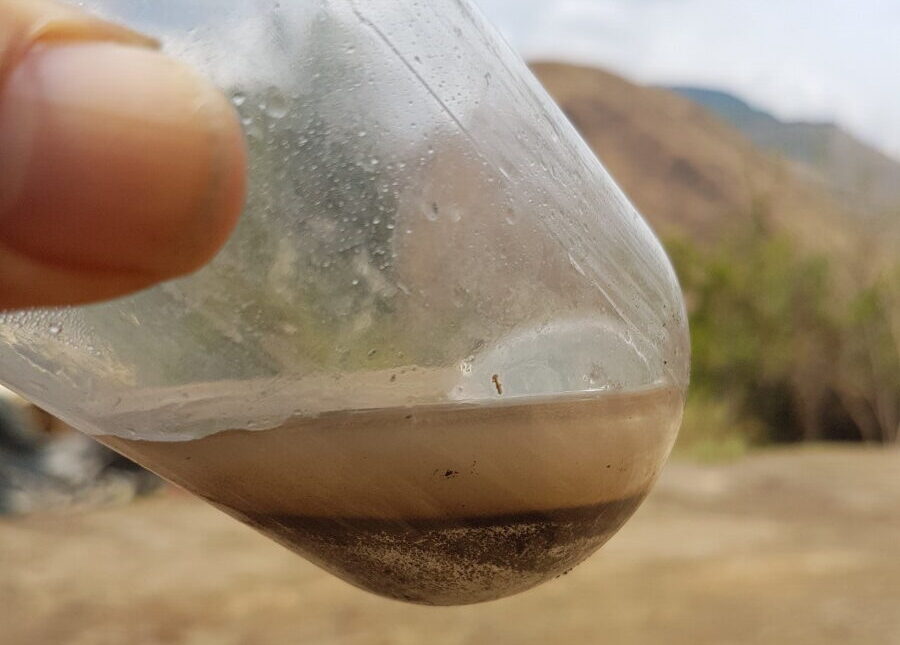
With funding from the UNDP (United Nations Development Program), we identified and tested a methodology that includes physical and chemical methods for the collection of mercury and gold from three mine tailings in Colombia.
Field tests were developed in 2022 to review the available alternatives for the recovery of mercury and residual gold. Through these recovery tests, more than 90 tons of tailings from different municipalities in the country were processed.
Under this project, a financial evaluation was also developed, which resulted in an economic model for the implementation of the mercury recovery technology with copper plates. The result of this economic model showed the feasibility of the process, its profitability, and the economic return to the miner in a projection of five years of operation.
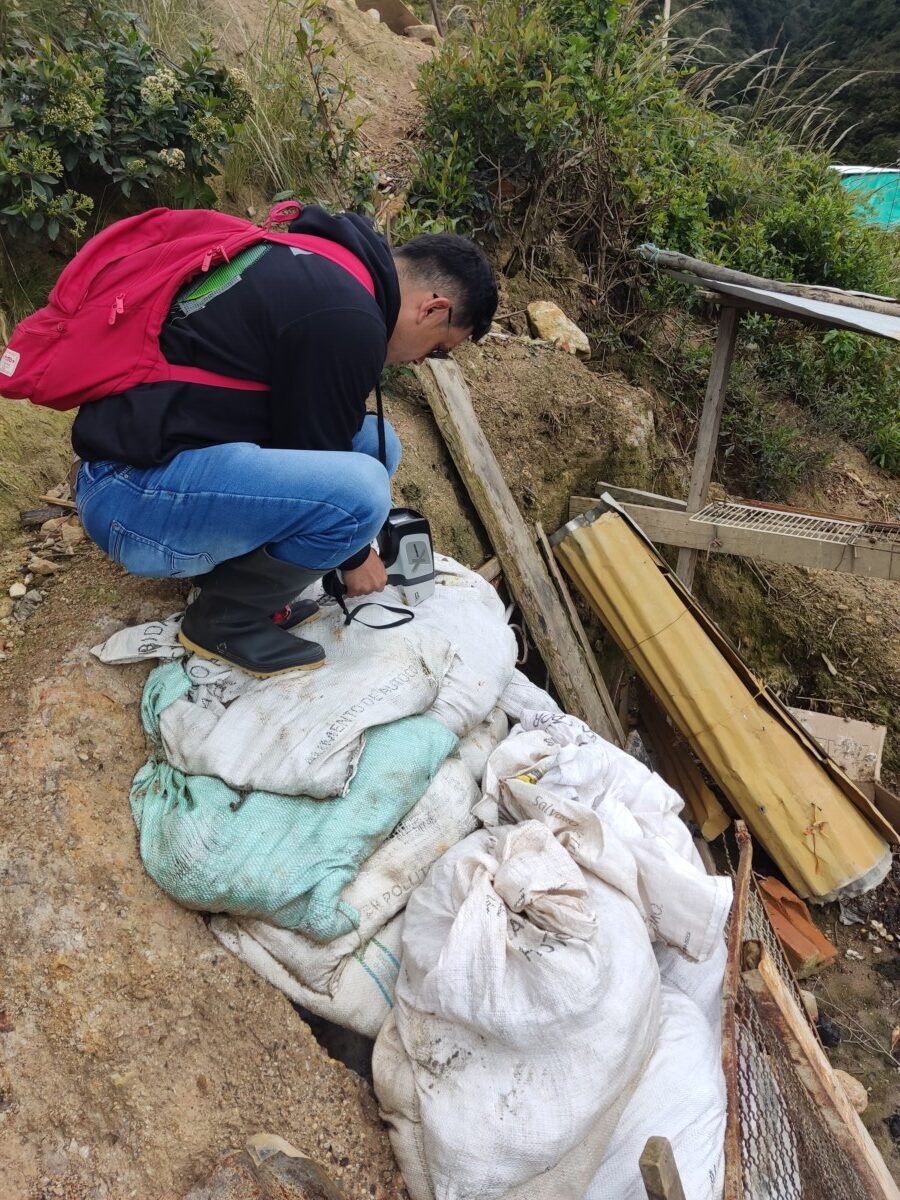
Pure Earth Colombia also developed a circular economy model based on the concentration of other precious metals found in the characterization of more than 80 tailings in 11 departments of Colombia. The team took into account international price projections through 2026 for Gold (Au), Silver (Ag), Copper (Cu), Lead (Pb) and Zinc (Zn).
Winning a global competition for developing a breakthrough solution to remove mercury from waste tailings
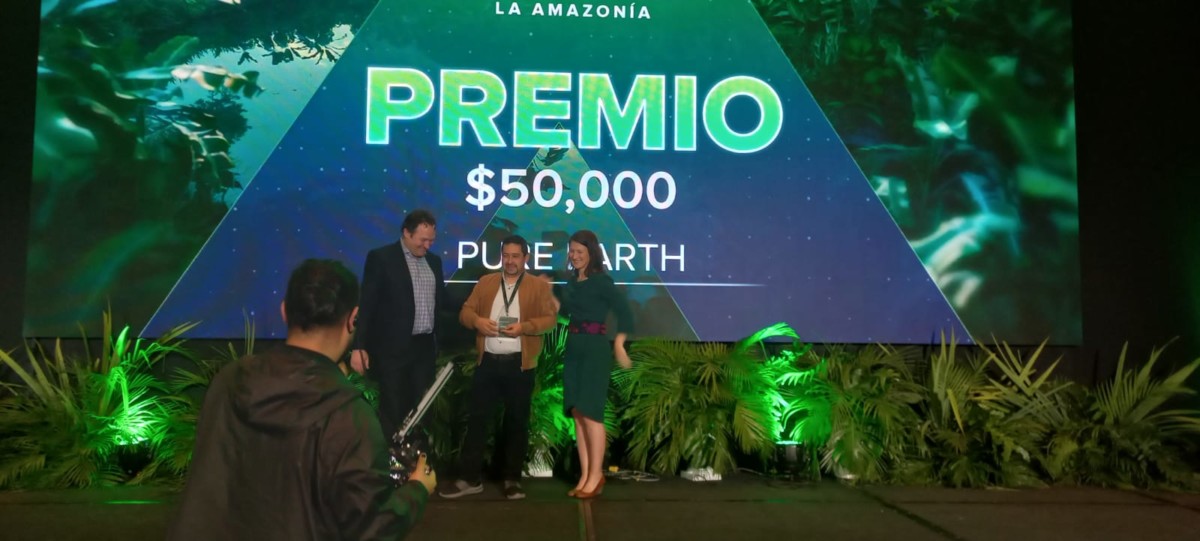
Out of 121 applicants from 22 countries, the team from Pure Earth Colombia emerged as one of four winners of The Artisanal Mining Grand Challenge to develop new innovations to conserve the Amazon rainforest. Pure Earth’s innovative technique uses copper plates to decontaminate mercury-filled waste tailings from artisanal and small-scale gold mining (ASGM).
The team was able to show up to 74% of mercury recovery from contaminated ASGM tailings using the copper plates techniques. Additionally, the team designed a scale model to be implemented in remote areas that do not have the required water and electricity services.
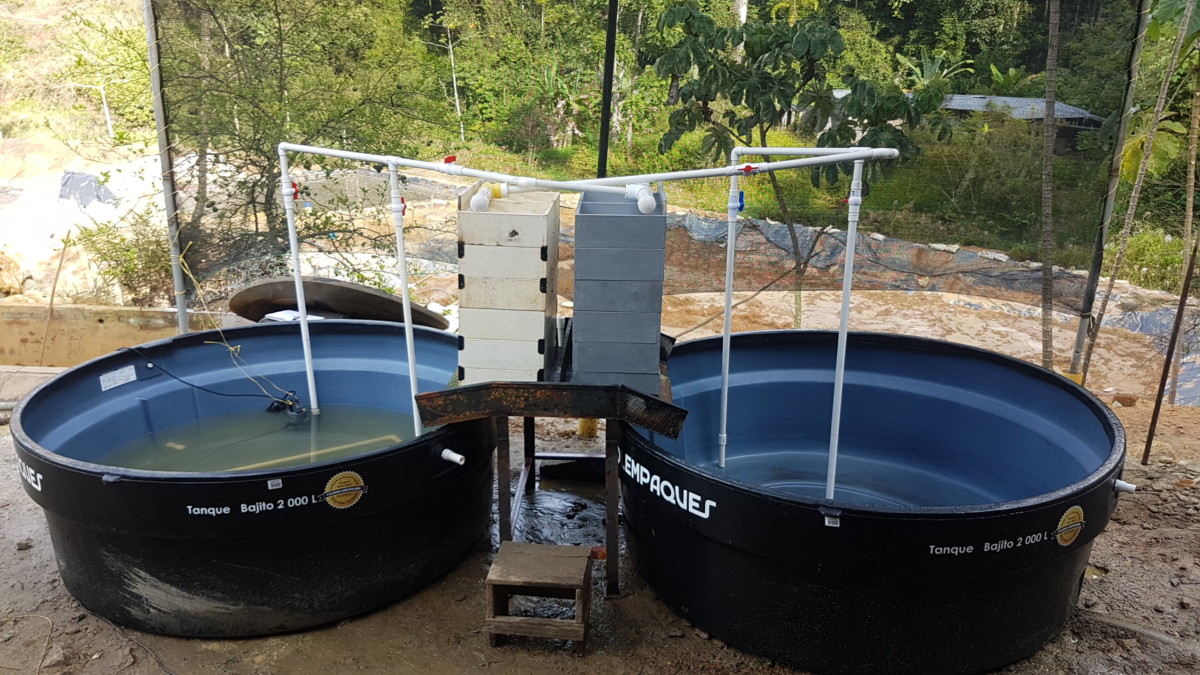
LEAD PROJECTS
We are currently helping five countries, including Colombia, with the ability to assess and identify their capacity to test for the presence of lead in vulnerable groups; collect and standardize relevant data and make rapid identification and intervention in possible cases of lead poisoning; and mitigate the effects of long-term health effects.
With this challenge in mind, Pure Earth Colombia’s technical team is being strengthened for 2023 in the area of health with the integration of a coordinator of health programs in Colombia.
This is how we envision a promising future, where our contribution as a technical reference and strategic ally for the implementation of high impact projects in Colombia allows us to visualize the opportunities we have as a country to protect health and care for the environment.
Development of lead mass balance methodology in Mercosur countries
Taking into account the need to control lead consumed in the countries that are part of the Mercosur group, and thanks to funding from the Global Alliance of Health and Pollution (GAHP), Pure Earth Colombia developed a methodology for calculating the lead mass balance, which consists of a protocol, a Word template, and an Excel template. This methodology was implemented with information available for Argentina, Brazil, Paraguay and Uruguay.
The purpose of this tool is to gather information and propose strategies for the management of hazardous lead waste, as well as to raise awareness of the need to report information corresponding to vehicle fleets and imports and exports, as this facilitates comparison between countries and decision-making.
Rapid Market Screening

Since July 2021, a project called Rapid Market Screening funded by Give Well has been underway in 25 countries around the world, including Colombia. The project seeks to identify potential sources of lead in products sold in markets, implement interventions to reduce lead exposure from the most important sources, and carry out baseline analyses of blood lead levels to estimate the effect of the interventions.
We Are Pure Earth Colombia: Meet The Team
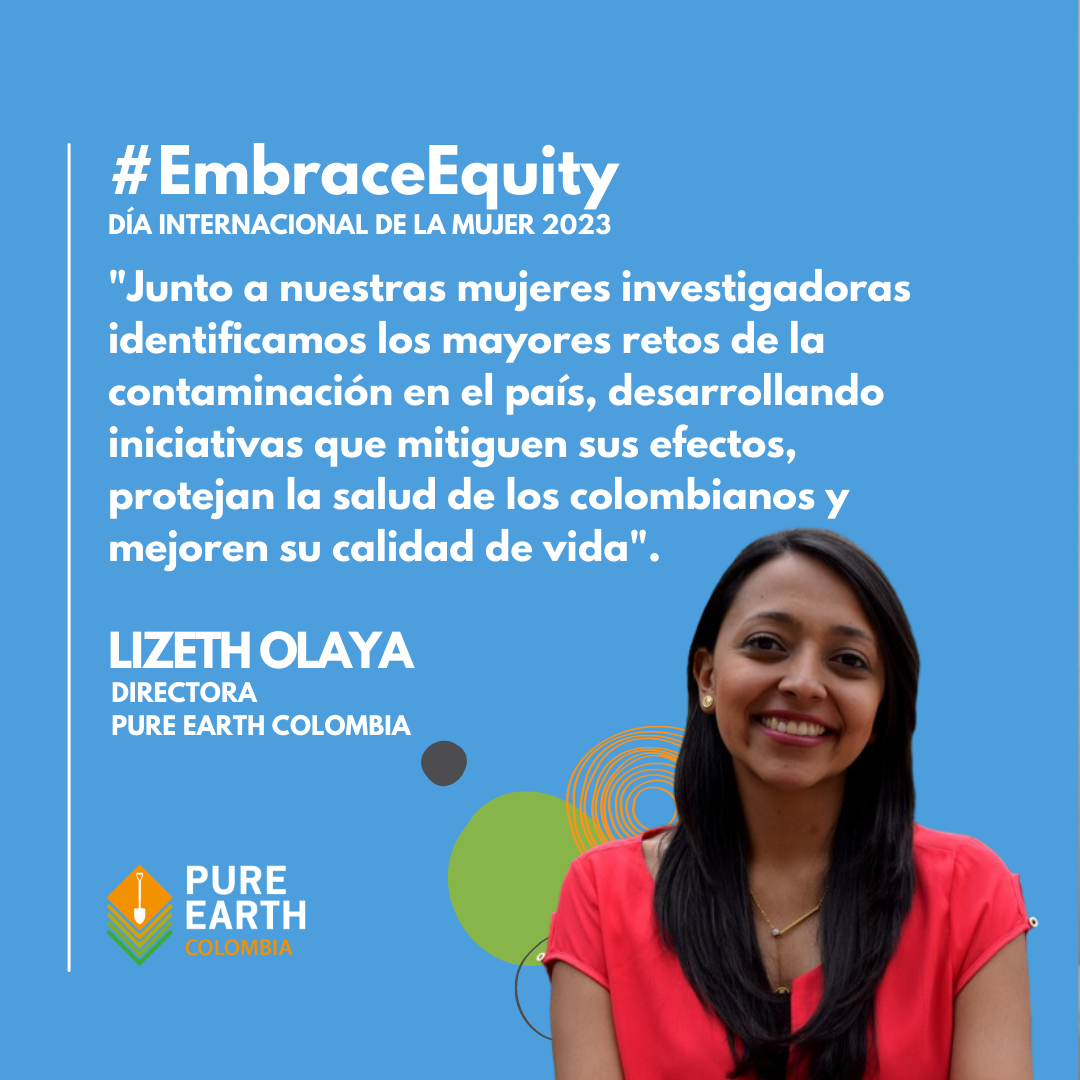
Lizeth Olaya Zambrano – Country Director
Prior to Pure Earth, Lizeth worked on the development of environmental and health issues in the region, and was part of the team that developed the Health and Pollution Action Plan for Colombia and the national coordination of the UNIDO (United Nations Industrial Development Organization) Global Eco-Industrial Parks program.
She is an Environmental Engineer, with a Master’s degree in Environmental Engineering from Universidad de Los Andes, Colombia, and she is currently pursuing an MBA. Since February 2023, Lizeth has led the activities of the Pure Earth Colombia team. She is committed to the protection of the environment and the health of communities as the main engine to drive project innovation in the region.
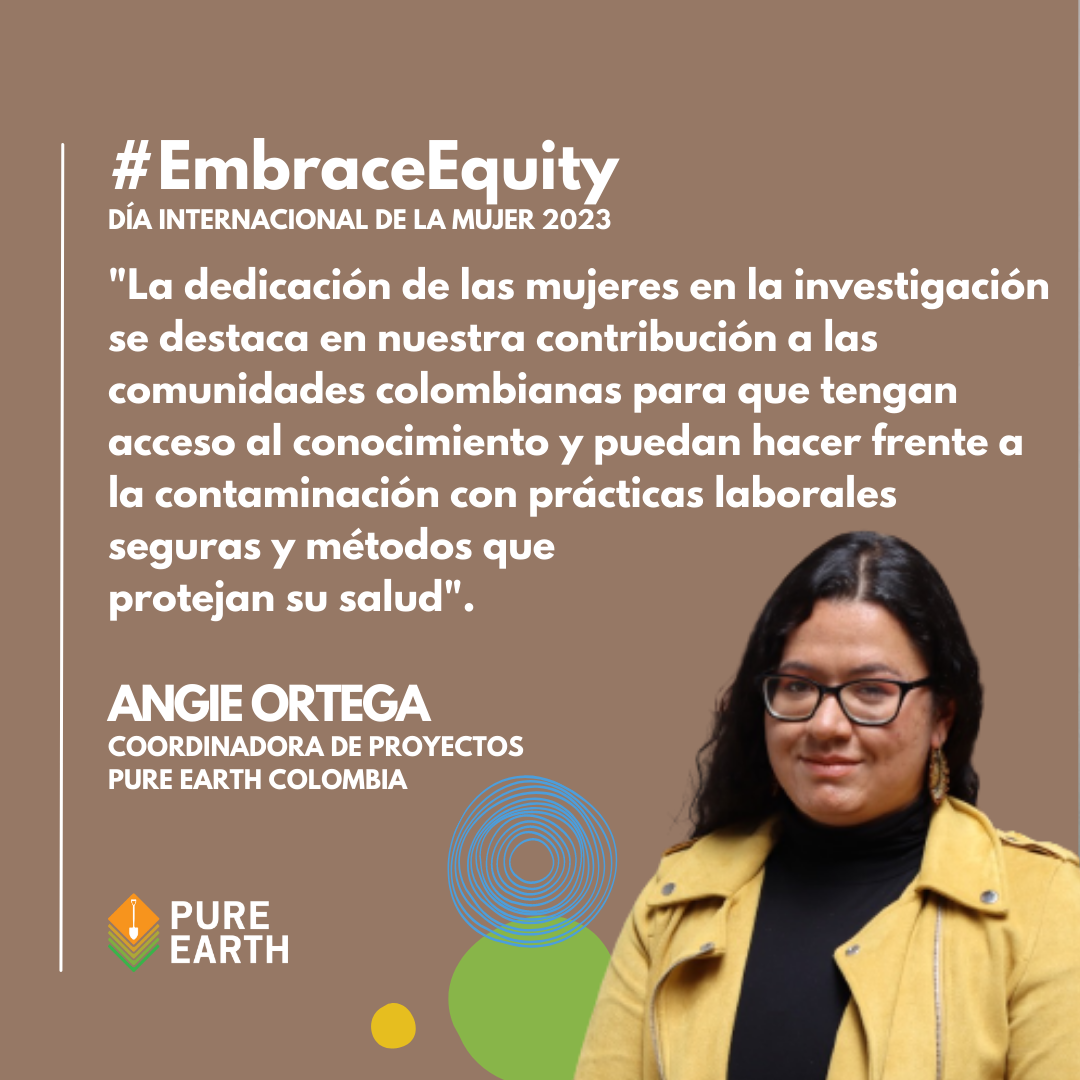
Angie Tatiana Ortega – Project Coordinator
Angie leads the Pure Earth Colombia team. Her inspiring dedication and extensive experience implementing projects and research for the development of solutions to pollution have led to the significant advancement of local communities in safe and healthy practices. She is a chemical and petroleum engineer and project management specialist with a Masters in Environmental Management for Competitiveness and a Ph.D. in Sustainability.
She has 11 years of experience in the chemical, oil and gas, mining, environmental, sustainability, projects and entrepreneurship sectors. Over the last five years, she has promoted the mobilization of different actors in environmental health issues, identification of contaminated sites, cleaner production, environmental impact assessment and work with communities.
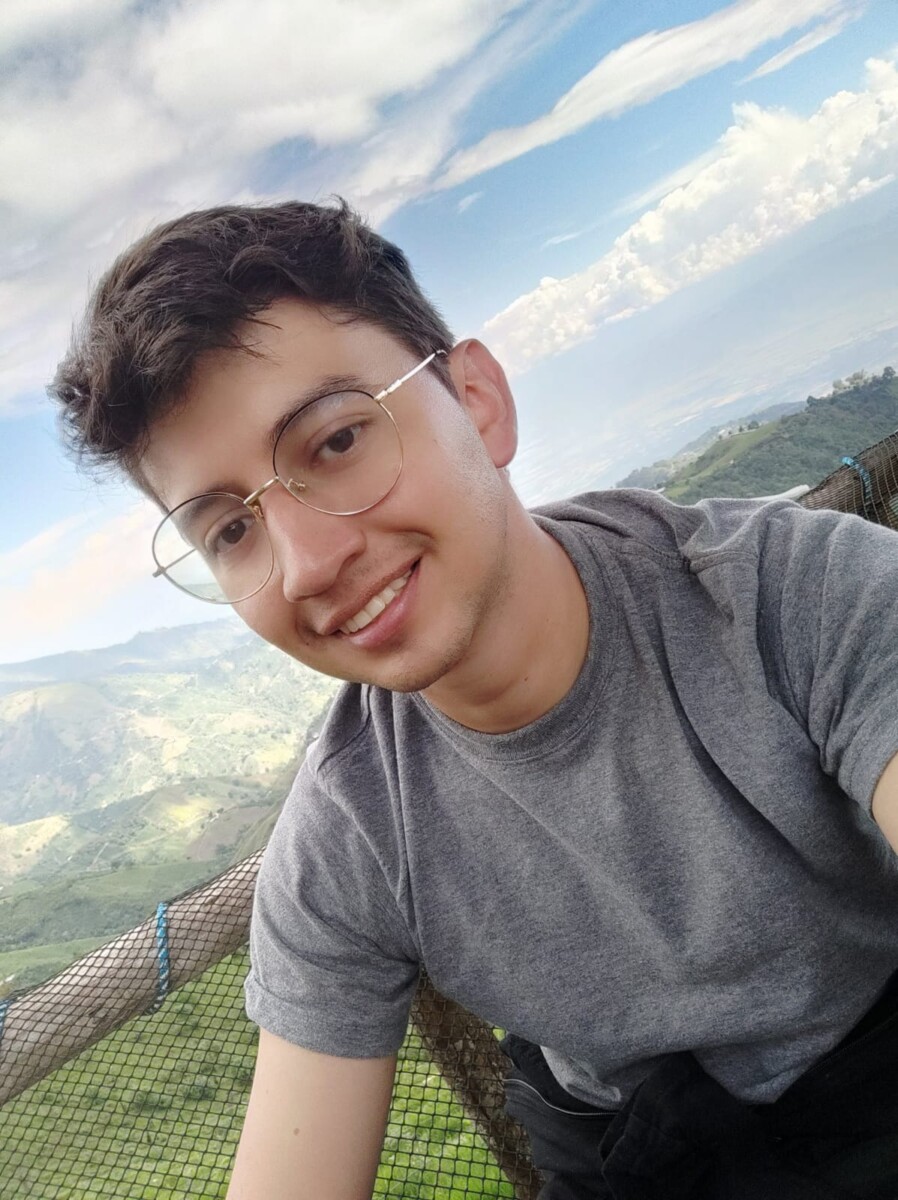
Diego Marín – Senior Researcher
Diego is a petroleum engineer with a degree in chemical engineering and a specialization in environmental management. His performance as a researcher on Pure Earth Colombia’s technical team for more than two years has driven the innovation of projects developed in the characterization of sites allegedly contaminated with mercury, and especially in the research and development of technologies for the remediation of environmental liabilities through copper plates.
Additionally, he is a permanent promoter and mobilizer of mining communities towards the elimination of the use of mercury in their productive activities, raising awareness of the impacts that can generate on health and the environment.
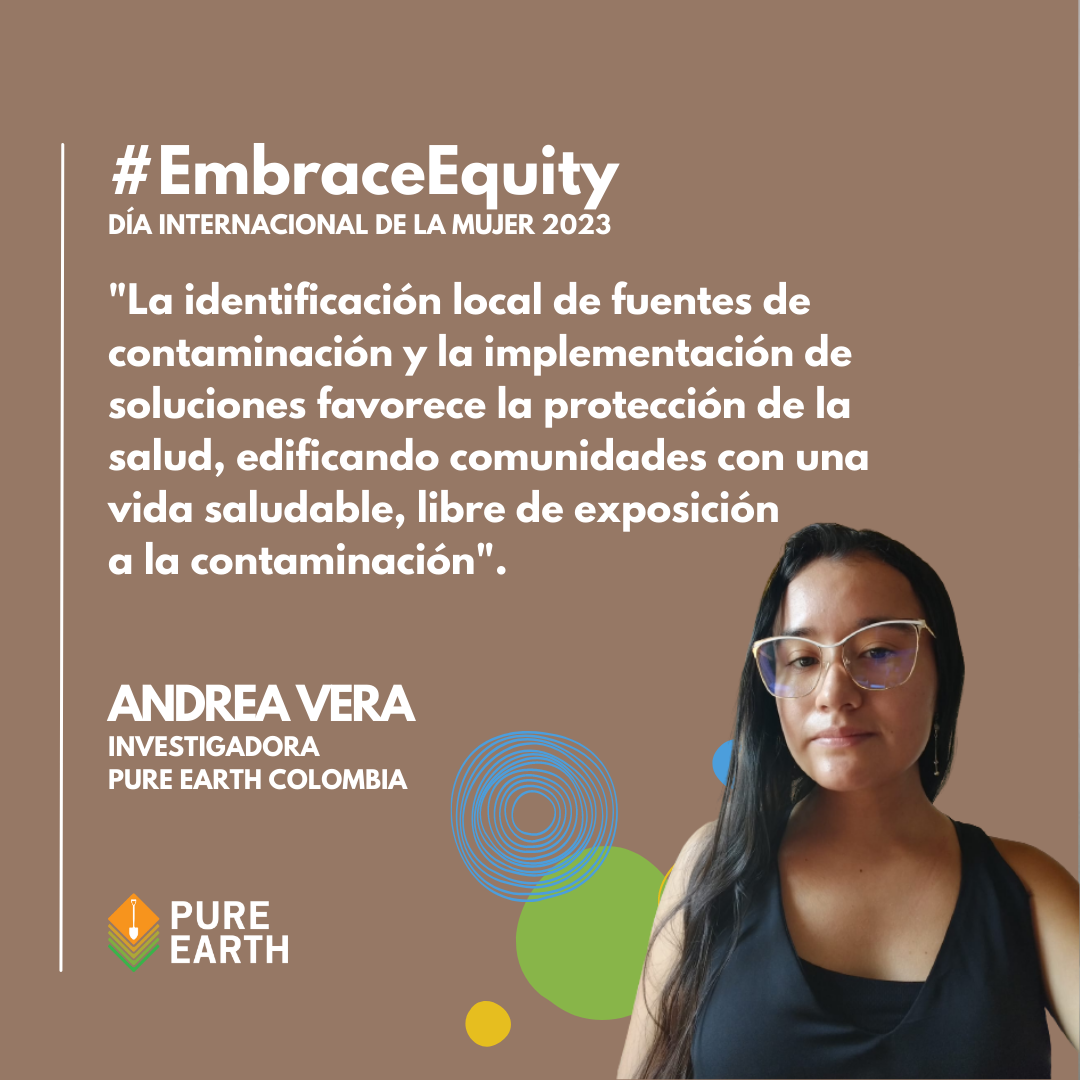
Andrea Vera – Junior Researcher
Andrea is a Chemical Engineer, and researcher of the Pure Earth team in Colombia. Her commitment and dedication to implementing solutions for a life free of exposure to pollution have been the driving forces in the collection and identification of pollution sources.
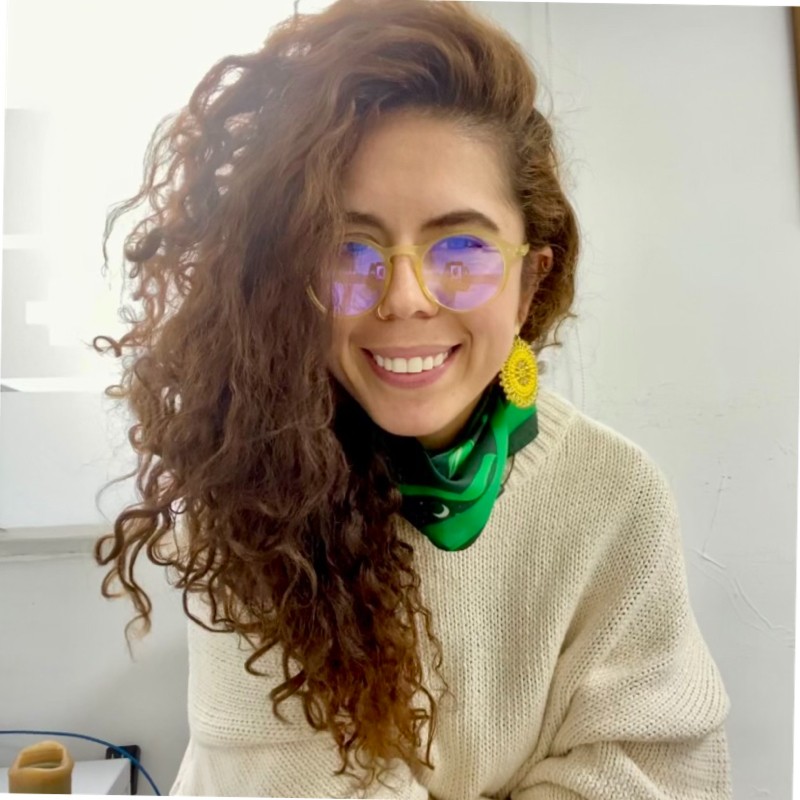
Daniela Alonso Molano – Health Programs Coordinator
Daniela is a health physician specializing in human rights and gender issues, and with extensive experience in research in vulnerable populations and the implementation of prevention and health promotion programs.
With her outstanding interest in finding solutions for the country’s social problems, Daniela opens a new research perspective as the new coordinator of health programs for Colombia.



